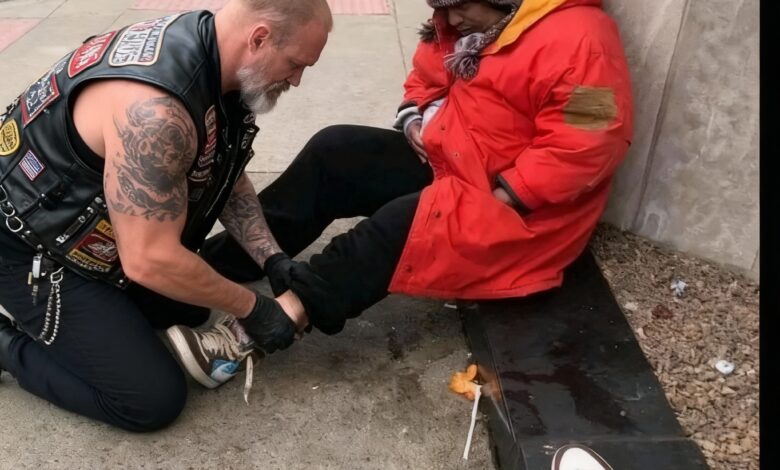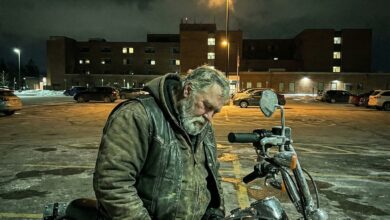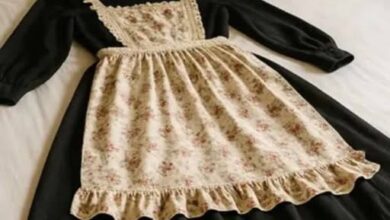
This Biker Kept Buying Shoes For Homeless Woman Until She Finally Told Him Why
This biker kept buying shoes for homeless woman until she finally told him why she threw every pair away.
For three months, I watched this massive guy with a gray beard and leather vest show up every Tuesday morning at the same street corner downtown. And every Tuesday, he’d kneel beside this elderly Black woman in a red coat and try to give her new shoes.
And every single time, she’d refuse them.
I’m a patrol officer for the city. Officer Mike Chen. I’ve walked this beat for seven years and I’ve seen this woman—everyone calls her Miss Rose—sitting on that same corner for at least five of those years.
Summer, winter, rain, snow. Always in that red coat. Always barefoot or wearing shoes so destroyed they barely qualified as shoes anymore.
Dozens of people had tried to help her over the years. Brought her shoes, socks, blankets, food. She’d take the food and blankets. But never the shoes. She’d smile politely, say “no thank you,” and that was that.
But this biker was different. He didn’t just try once and give up. Every Tuesday morning at 9 AM, like clockwork, he’d show up with a new pair of shoes. Nice ones too. Not cheap dollar store shoes. Real quality sneakers, boots, winter shoes.
And every Tuesday, Miss Rose would say no. I finally approached him one morning in late February. It was freezing. Maybe fifteen degrees. Miss Rose was sitting on the sidewalk with her feet bare, red and swollen from the cold. And here comes this biker again, carrying another shoebox.
“Hey man,” I said. “I appreciate what you’re trying to do, but she’s not going to accept them. Trust me. A lot of people have tried.”
The biker looked at me with these intense blue eyes. “I know. But I’m not stopping until she tells me why.”
“Why what?”
“Why she won’t wear shoes. There’s a reason. There’s always a reason.” He knelt down beside Miss Rose like he’d done a dozen times before. “Good morning, Miss Rose. I brought you something.”
Miss Rose looked at the shoebox and smiled sadly. “Baby, you’re wasting your money on me. I can’t accept those.”
“Can’t or won’t?” the biker asked gently.
“Both.” She pulled her red coat tighter around herself. Her feet were purple with cold.
“Miss Rose, it’s fifteen degrees out here. Your feet are freezing. Please. Just let me help you.”
She shook her head. “You don’t understand. I appreciate what you’re trying to do. But I can’t wear shoes. I just can’t.”
The biker sat down on the sidewalk next to her. This big intimidating-looking guy in leather and patches, just sitting on the frozen concrete. “Then help me understand. Tell me why.”
Miss Rose looked away. “It’s a long story. And it’s foolish. You’d think I was crazy.”
“I’ve got time. And I don’t think anyone’s crazy.” The biker opened his vest and pulled out a thermos. “I brought coffee. Two cups. Will you at least share some coffee with me and tell me your story?”
I stood there watching, frozen myself, as Miss Rose stared at this stranger. This biker who’d been showing up every Tuesday for months. Who wouldn’t give up. Who wasn’t treating her like a charity case or a problem to be solved.
Who was treating her like a person.
Finally, Miss Rose took the cup of coffee. “Alright. I’ll tell you. But you’ll think I’m a foolish old woman.”
“I promise I won’t.” The biker poured coffee for both of them. Steam rose in the cold air.
Miss Rose took a sip and closed her eyes. “These are the first shoes I ever bought with my own money,” she said, pointing to her feet. The “shoes” were barely held together with duct tape. The soles had holes. The laces were missing. “I was forty-three years old when I bought these shoes. Forty-three.”
She opened her eyes and they were filled with tears. “I grew up in Alabama. Dirt poor. We didn’t have shoes. We went barefoot most of the time. When I was seven, I stepped on a nail and it went clear through my foot. Got infected. Almost died. My mama wrapped my foot in rags and prayed over me because we couldn’t afford a doctor.”
The biker listened silently, holding his coffee.
“When I was twelve, the church gave us donated shoes. But they were all too small. My feet bled for months until they finally stretched enough to fit. I dreamed about having shoes that fit. Shoes that were mine. Shoes I chose.”
“When I was sixteen, I got pregnant. The father left. My family kicked me out. Said I was a disgrace. I walked from Alabama to Tennessee with no shoes. My feet bled the whole way. Two hundred and forty miles. I lost the baby halfway there.”
Miss Rose was crying now. The biker reached out and held her hand.
“I worked for forty-three years. Cleaning houses. Washing dishes. Whatever I could find. Every penny I made went to feeding my other children—I had three more over the years, all from different fathers who left. Every penny went to keeping a roof over our heads. I wore whatever shoes I could find in donation bins or trash cans.”
“And then one day, my youngest graduated high school. First person in my family to ever graduate. I had fifty-seven dollars left over after paying bills that month. And I walked into a shoe store for the first time in my life.”
She smiled through her tears. “I tried on every pair in the store. The saleswoman was so patient with me. Didn’t treat me like trash even though I came in wearing rags. I picked these red sneakers. Brand new. Size eight and a half. Perfect fit. Cost me forty-three dollars.”
“I wore them out of the store. Walked ten blocks just to feel them on my feet. My shoes. Shoes I bought. Shoes I chose. I cried the whole way home.” Miss Rose looked down at the destroyed shoes on her feet. “That was thirty-eight years ago. These are those same shoes.”
The biker stared at her. “You’ve been wearing the same shoes for thirty-eight years?”
“Only shoes I ever bought myself. Only shoes that were ever really mine.” She wiped her eyes. “I know it’s crazy. I know they’re falling apart. I know my feet are freezing. But if I throw these away, I’m throwing away the only thing I ever bought just for me. The only proof that I mattered. That I was worth something.”
“Everyone keeps trying to give me new shoes. And I appreciate it, I really do. But they don’t understand. It’s not about having shoes. It’s about having these shoes. My shoes. The ones I chose when I finally had a choice.”
The biker was quiet for a long time. Then he said, “What if I told you that keeping these shoes doesn’t mean you didn’t matter? What if I told you that accepting new shoes doesn’t erase what these represent?”
Miss Rose shook her head. “You don’t understand.”
“Maybe I don’t. But I’d like to tell you a story too, if that’s okay.” Miss Rose nodded slowly.
“My name is Thomas. I’m sixty-six years old. I’ve been riding motorcycles for forty-four years. And I’ve been sober for thirty-eight years.” He took a sip of coffee. “I was an alcoholic. Lost everything. My wife. My kids. My job. My house. I was living under a bridge, drinking myself to death.”
“One day, a man stopped and gave me his jacket. It was January. Freezing cold. This jacket was beautiful—leather, lined with wool, probably cost three hundred dollars. He just took it off his back and gave it to me.”
“I wore that jacket every single day for three years. Even after I got sober. Even after I got my life back. Even after I could afford my own jacket. Because that jacket represented the moment someone saw me as human. The moment someone cared enough to help.”
Thomas pulled his vest open. Underneath was a worn leather jacket. “This is that jacket. Thirty-eight years old. Same as your shoes. I had it repaired dozens of times. Re-lined. Patched. But I can’t let it go. Because it saved my life.”
Miss Rose stared at him. “So you do understand.”
“I understand completely. But Miss Rose, eventually I realized something. That jacket saved my life, but holding onto it was keeping me stuck in the past. It was keeping me from moving forward. It was keeping me from accepting that I deserved better now.”
He reached into the shoebox. “So I made a choice. I kept the jacket as a reminder of where I came from. But I allowed myself to have new things too. To accept that I was worth more than just survival.”
He pulled out the shoes. Women’s sneakers. Red. Size eight and a half. “Miss Rose, these shoes don’t replace what those mean to you. They honor it. They say that woman who saved fifty-seven dollars and bought her first pair of shoes? She deserves to have warm feet. She deserves to not be in pain. She deserves to have shoes that work.”
Thomas pulled something else from his vest. A small wooden box. “And if you accept these new shoes, I’d like to do something with your old ones. I’d like to take them to a cobbler I know. Have him preserve them. Mount them in a case. So you can keep them forever. So they never disappear. But so they also don’t have to hurt you anymore.”
Miss Rose stared at the box. At the new shoes. At this biker who’d shown up every Tuesday for three months. “Why?” she whispered. “Why do you care so much?”
“Because thirty-eight years ago, someone saw me as human when everyone else saw trash. And I’ve spent every day since trying to be that person for someone else.” Thomas held out the shoes. “Please, Miss Rose. Let me be that person for you today.”
I watched Miss Rose sit there on that freezing sidewalk, tears streaming down her face. Watched her look at her destroyed shoes. At the new ones. At this biker who wouldn’t give up.
Finally, she nodded.
Thomas knelt in front of her. Carefully, gently, he removed her old shoes. Her feet were covered in blisters and calluses and scars. He pulled out socks from the shoebox—thick, warm socks—and carefully put them on her feet.
Then the new shoes. Red sneakers. Size eight and a half. Just like her first pair.
Miss Rose stood up slowly. Took a few steps. Started crying. “They fit. They actually fit.”
“Of course they fit. I asked you your size three months ago, remember?” Thomas was crying too. He carefully placed her old shoes in the wooden box. “I promise I’ll take care of these. I’ll bring them back to you preserved and protected. So you can always remember what they mean.”
Miss Rose threw her arms around him. This small elderly woman hugging this massive biker on a street corner at 9 AM on a Tuesday in February. Both of them sobbing.
I had to turn away. Had to wipe my own eyes.
Thomas kept his promise. Two weeks later, he brought back her old shoes mounted in a beautiful glass case with a plaque that read: “The shoes that proved I mattered. Bought with my own money after 43 years. A reminder that I was always worth it.”
Miss Rose kept that case in her shopping cart—yes, she was still homeless. But now she was homeless in proper shoes. And with a friend who showed up every Tuesday.
I talked to Thomas one morning a few weeks after that. “Why did you keep coming back? Why did you care so much about this one woman?”
He smiled. “Because someone kept coming back for me. Someone wouldn’t give up even when I’d given up on myself. And that person saved my life.”
“So when I see someone suffering, someone stuck, someone holding onto pain because it’s the only thing they have—I remember being that person. And I remember how much it meant that someone didn’t walk away.” He looked at Miss Rose, who was sitting on her corner in her new shoes, drinking coffee from his thermos. “We all deserve to be seen. To be heard. To be valued. And sometimes it takes showing up every Tuesday for three months to prove that.”
That was four years ago. Thomas still shows up every Tuesday. Miss Rose eventually agreed to go to a shelter—but only after Thomas helped her find one that would let her keep her shopping cart with all her belongings, including that case with her old shoes.
She has a room now. A bed. Heat. Running water. And a whole collection of shoes that Thomas brings her—one pair every few months. She doesn’t need them anymore. She accepts them anyway.
Because they’re not about the shoes. They never were. They’re about being seen. Being valued. Being worth someone’s time.
And that’s what Thomas gave her. What that man under the bridge gave him thirty-eight years ago. What we all need to give each other.
The gift of showing up. Of not giving up. Of saying through our actions: you matter. You’re worth it. You deserve warmth and comfort and dignity.
Even if it takes three months of Tuesdays to prove it.
Miss Rose still has those old red shoes in their glass case. She keeps them by her bed. Looks at them every morning. And then she puts on one of her new pairs and goes about her day.
Moving forward while honoring where she came from. Just like Thomas taught her. Just like someone taught him.
That’s what real help looks like. Not forcing people to accept what we think they need. But taking the time to understand why they hurt. Why they hold on. What they really need to heal.
Sometimes healing isn’t about replacing what’s broken. It’s about honoring it while making space for something better.
Thomas taught me that. Miss Rose taught me that. And every Tuesday morning when I see them having coffee on that corner—her in her new shoes, him in his ancient jacket—I’m reminded that the most powerful thing we can do for each other is show up.
Keep showing up. Even when it’s hard. Even when it seems hopeless. Even when it takes three months to understand why.
Because everyone has a story. Everyone has a reason. Everyone deserves someone who’ll sit on a frozen sidewalk and listen until they finally feel safe enough to tell the truth.
The biker kept buying shoes for the homeless woman until she finally told him why.
And when she did, he gave her something worth more than shoes. He gave her dignity. Understanding. Proof that she mattered.
And that changed everything.




